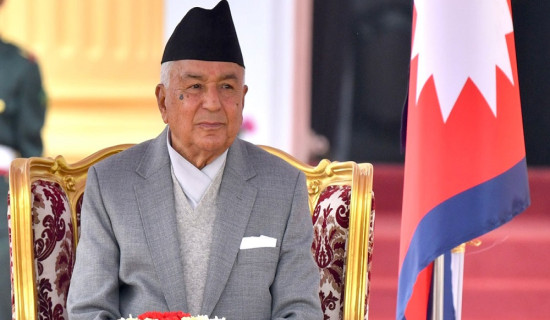- Friday, 30 January 2026
Imported cases threaten target to Malaria elimination by 2025: Experts
By Mahima Devkota, Kathmandu, May 31: Experts have said
that newly detected 26 cases of Malaria at Balara Municipality of Sarlahi
district along with 391 total recorded cases of Malaria this year, can be the
hurdle to achieving the target of eradicating the disease by 2025.
Officials at the
Epidemiology and Disease Control Division said that imported cases of malaria
are the biggest challenge to achieving the target of eliminating it in the
country by the year 2025.
The report of
the Epidemiology and Disease Control Division (EDCD) revealed that 391 cases
have been detected throughout the country, of them, 359 were imported and 336
cases alone were from India.
Dr Chuman Lal
Das, EDCD said that newly detected cases of Malaria come in a way of achieving
the target. He said, “In order to minimize imported cases of malaria in the
country, the Ministry of Health and Population (MoHP) has initiated
cross-border collaboration with India and drew the attention to the growing
number of cases in Nepal.”
“We have
requested officials of the Uttar Pradesh, India as well as another Indian state
for the coordination,” He said while informing that many majorities of imported
cases have been detected to foreign migratory workers of Nepal working in
Maharashtra and Gujarat.
According to the
World Health Organization (WHO), to earn malaria-free status in 2026, Nepal
needs to bring down indigenous cases or local transmission of the disease to
zero by the end of 2022 and sustain zero cases for three consecutive years.
The government
has a target to reduce malaria cases by 2022 and eradicate the disease by 2025.
An estimated 8.2 million people in Nepal are at risk of malaria, as per WHO.
Dr Gokarna
Dayal, a senior official at the division said that there is a target to reduce
cases of Malaria this year and to bring it down to zero cases by the years 2023
and 2024, to finally eliminate it by the year 2025. Therefore, detection of new
cases is not good news but efforts have been maximized to reduce them.
He said, “In order to curb the spread of Malaria in Balera Rural municipality, we did vector surveillance to find out if Malaria spread via vector. Indoor residual spraying (IRS), a core vector intervention that can rapidly reduce malaria transmission has been performed as well community awareness in this regard has been made.”
This year there
is an initiative to start testing at the point of entry and community-based
testing. The 26 cases of Malaria were detected in the community testing. Similarly,
the health ministry said that rapid diagnostic test kits have been supplied to
health desks set up at border crossings and in most of the state-run health
facilities throughout the country.
The Ministry of Health and Population said that rapid diagnostic test kits have been supplied to the health desks set up at border crossings with India and in most of the state-run health facilities throughout the country.




-square-thumb.jpg)




-original-thumb.jpg)

-original-thumb.jpg)
-original-thumb.jpg)

